Xi Jinping
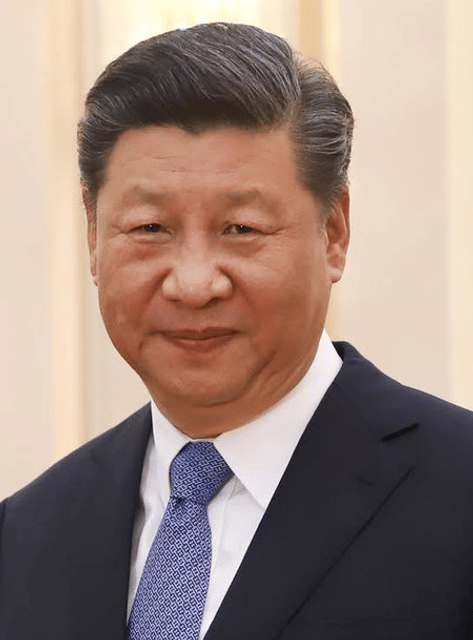
Xi Jinping

Xi Jinping | |||||||||||||||||||||||||||||||||
|---|---|---|---|---|---|---|---|---|---|---|---|---|---|---|---|---|---|---|---|---|---|---|---|---|---|---|---|---|---|---|---|---|---|
习近平 | |||||||||||||||||||||||||||||||||
| General Secretary of the Communist Party of China | |||||||||||||||||||||||||||||||||
| Assumed office 15 November 2012 | |||||||||||||||||||||||||||||||||
| Preceded by | Hu Jintao | ||||||||||||||||||||||||||||||||
| President of the People's Republic of China | |||||||||||||||||||||||||||||||||
| Assumed office 14 March 2013 | |||||||||||||||||||||||||||||||||
| Premier | Li Keqiang | ||||||||||||||||||||||||||||||||
| Vice President | Li Yuanchao Wang Qishan | ||||||||||||||||||||||||||||||||
| Preceded by | Hu Jintao | ||||||||||||||||||||||||||||||||
Additional positions | |||||||||||||||||||||||||||||||||
| Chairman of the Central Military Commission | |||||||||||||||||||||||||||||||||
| Assumed office 15 November 2012 (Party Commission) 14 March 2013 (State Commission) | |||||||||||||||||||||||||||||||||
| Deputy | Fan Changlong Xu Qiliang Zhang Youxia | ||||||||||||||||||||||||||||||||
| Preceded by | Hu Jintao | ||||||||||||||||||||||||||||||||
| Chairman of the National Security Commission of the Communist Party | |||||||||||||||||||||||||||||||||
| Assumed office 25 January 2014 | |||||||||||||||||||||||||||||||||
| Deputy | Li Keqiang (since 2014) Zhang Dejiang (until 2018) Li Zhanshu (since 2018) | ||||||||||||||||||||||||||||||||
| Preceded by | New position | ||||||||||||||||||||||||||||||||
| Chairman of the Central Comprehensively Deepening Reforms Commission | |||||||||||||||||||||||||||||||||
| Assumed office 28 March 2018 | |||||||||||||||||||||||||||||||||
| Deputy | Li Keqiang Wang Huning Han Zheng | ||||||||||||||||||||||||||||||||
| Preceded by | Himself (as Group leader) | ||||||||||||||||||||||||||||||||
| Chairman of the Central Financial and Economic Affairs Commission | |||||||||||||||||||||||||||||||||
| Assumed office 2 April 2018 | |||||||||||||||||||||||||||||||||
| Deputy | Li Keqiang | ||||||||||||||||||||||||||||||||
| Preceded by | Himself (as Group leader) | ||||||||||||||||||||||||||||||||
| Chairman of the Central Foreign Affairs Commission | |||||||||||||||||||||||||||||||||
| Assumed office 15 May 2018 | |||||||||||||||||||||||||||||||||
| Deputy | Li Keqiang | ||||||||||||||||||||||||||||||||
| Preceded by | Himself (as Group leader) | ||||||||||||||||||||||||||||||||
| 8th Vice President of the People's Republic of China | |||||||||||||||||||||||||||||||||
| In office 15 March 2008 – 14 March 2013 | |||||||||||||||||||||||||||||||||
| President | Hu Jintao | ||||||||||||||||||||||||||||||||
| Preceded by | Zeng Qinghong | ||||||||||||||||||||||||||||||||
| Succeeded by | Li Yuanchao | ||||||||||||||||||||||||||||||||
| Personal details | |||||||||||||||||||||||||||||||||
| Born | (1953-06-15)15 June 1953 Beijing | ||||||||||||||||||||||||||||||||
| Nationality | Chinese | ||||||||||||||||||||||||||||||||
| Political party | |||||||||||||||||||||||||||||||||
| Spouse(s) |
| ||||||||||||||||||||||||||||||||
| Children | Xi Mingze (daughter) | ||||||||||||||||||||||||||||||||
| Parents |
| ||||||||||||||||||||||||||||||||
| Relatives |
| ||||||||||||||||||||||||||||||||
| Residence | Zhongnanhai | ||||||||||||||||||||||||||||||||
| Education | Tsinghua University (BE, LLD)[1] | ||||||||||||||||||||||||||||||||
| Signature |  | ||||||||||||||||||||||||||||||||
| Military service | |||||||||||||||||||||||||||||||||
| Allegiance | |||||||||||||||||||||||||||||||||
| Branch/service | |||||||||||||||||||||||||||||||||
| Years of service | 1979–1982 | ||||||||||||||||||||||||||||||||
| Unit | General Office of the Central Military Commission (1979–1982, as a secretary of Defense Minister Geng Biao) | ||||||||||||||||||||||||||||||||
Central institution membership
Leading Groups and Commissions
Other offices held
Paramount Leader of
the People's Republic of China
| |||||||||||||||||||||||||||||||||
| Xi Jinping | |||||||||||||||||||||||||||||||||
 "Xi Jinping" in Simplified (top) and Traditional (bottom) Chinese characters | |||||||||||||||||||||||||||||||||
| Simplified Chinese | 习近平 | ||||||||||||||||||||||||||||||||
| Traditional Chinese | 習近平 | ||||||||||||||||||||||||||||||||
| |||||||||||||||||||||||||||||||||
Xi Jinping (/ʃiː dʒɪnˈpɪŋ/;[8][9] Chinese: 习近平; Mandarin pronunciation: [ɕǐ tɕîn.pʰǐŋ]; born 15 June 1953) is a Chinese politician serving as General Secretary of the Communist Party of China (CPC),[10] President of the People's Republic of China (PRC),[11] and Chairman of the Central Military Commission (CMC).[12] Often described as China's "paramount leader" since 2012, he officially received the title of "core leader" from the CPC in 2016.[13] As general secretary, Xi holds an ex-officio seat on the Politburo Standing Committee of the Communist Party of China, China's top decision-making body.[14]
Xi is the first general secretary born after the Second World War and the establishment of the People's Republic of China. The son of Chinese Communist veteran Xi Zhongxun, he was exiled to rural Yanchuan County as a teenager following his father's purge during the Cultural Revolution, and lived in a cave in the village of Liangjiahe, where he worked as the party secretary.[15] After studying at the Tsinghua University as a "Worker-Peasant-Soldier student",[16] Xi rose through the ranks politically in China's coastal provinces. Xi was governor of Fujian from 1999 to 2002, and governor, then party secretary of neighbouring Zhejiang from 2002 to 2007. Following the dismissal of the CPC Secretary of Shanghai Chen Liangyu, Xi was transferred to replace him for a brief period in 2007. He joined the Politburo Standing Committee and central secretariat in October 2007, spending the next five years as Chinese paramount leader Hu Jintao's presumed successor. Xi was vice president from 2008 to 2013 and vice chairman of the Central Military Commission from 2010 to 2012.
Since assuming power, Xi has introduced far-ranging measures to enforce party discipline and to ensure internal unity. His signature anti-corruption campaign has led to the downfall of prominent incumbent and retired Communist Party officials, including members of the Politburo Standing Committee.[17] Described as a Chinese nationalist,[18] he has tightened restrictions over civil society and ideological discourse, advocating Internet censorship in China as the concept of "internet sovereignty".[19][20] Xi has called for further socialist market economic reforms, for governing according to the law and for strengthening legal institutions, with an emphasis on individual and national aspirations under the slogan "Chinese Dream".[21] He has also championed a more assertive foreign policy, particularly with regard to China–Japan relations, China's claims in the South China Sea, and its role as a leading advocate of free trade and globalization.[22] Xi has sought to expand China's African and Eurasian influence through the Belt and Road Initiative.[23][17]
Considered the central figure of the fifth generation of leadership of the People's Republic,[24] Xi has significantly centralised institutional power by taking on a wide range of leadership positions, including chairing the newly formed National Security Commission, as well as new steering committees on economic and social reforms, military restructuring and modernization, and the Internet. Said to be one of the most powerful leaders in modern Chinese history, Xi's political thoughts have been written into the party and state constitutions, and under his leadership the latter was amended to abolish term limits for the presidency.[25]
Due to his accumulation of more power than anyone since Mao Zedong, the significant increase of censorship and mass surveillance, significant deterioration in human rights, the return to a cult of personality and the removal of term limits for the President in 2018 under his rule, Xi Jinping has been called a dictator by many political observers.[2] However, Xi Jinping remains widely popular in China.[38][39] A YouGov poll released in July 2019 found that 22% of Chinese people list Xi as the person they admire the most.[40]
In 2017, The Economist named him the most powerful person in the world.[41] In 2018, Forbes ranked him as the most powerful and influential person in the world, replacing Russian President Vladimir Putin who had been so ranked for five consecutive years.[42]
Xi Jinping | |||||||||||||||||||||||||||||||||
|---|---|---|---|---|---|---|---|---|---|---|---|---|---|---|---|---|---|---|---|---|---|---|---|---|---|---|---|---|---|---|---|---|---|
习近平 | |||||||||||||||||||||||||||||||||
| General Secretary of the Communist Party of China | |||||||||||||||||||||||||||||||||
| Assumed office 15 November 2012 | |||||||||||||||||||||||||||||||||
| Preceded by | Hu Jintao | ||||||||||||||||||||||||||||||||
| President of the People's Republic of China | |||||||||||||||||||||||||||||||||
| Assumed office 14 March 2013 | |||||||||||||||||||||||||||||||||
| Premier | Li Keqiang | ||||||||||||||||||||||||||||||||
| Vice President | Li Yuanchao Wang Qishan | ||||||||||||||||||||||||||||||||
| Preceded by | Hu Jintao | ||||||||||||||||||||||||||||||||
Additional positions | |||||||||||||||||||||||||||||||||
| Chairman of the Central Military Commission | |||||||||||||||||||||||||||||||||
| Assumed office 15 November 2012 (Party Commission) 14 March 2013 (State Commission) | |||||||||||||||||||||||||||||||||
| Deputy | Fan Changlong Xu Qiliang Zhang Youxia | ||||||||||||||||||||||||||||||||
| Preceded by | Hu Jintao | ||||||||||||||||||||||||||||||||
| Chairman of the National Security Commission of the Communist Party | |||||||||||||||||||||||||||||||||
| Assumed office 25 January 2014 | |||||||||||||||||||||||||||||||||
| Deputy | Li Keqiang (since 2014) Zhang Dejiang (until 2018) Li Zhanshu (since 2018) | ||||||||||||||||||||||||||||||||
| Preceded by | New position | ||||||||||||||||||||||||||||||||
| Chairman of the Central Comprehensively Deepening Reforms Commission | |||||||||||||||||||||||||||||||||
| Assumed office 28 March 2018 | |||||||||||||||||||||||||||||||||
| Deputy | Li Keqiang Wang Huning Han Zheng | ||||||||||||||||||||||||||||||||
| Preceded by | Himself (as Group leader) | ||||||||||||||||||||||||||||||||
| Chairman of the Central Financial and Economic Affairs Commission | |||||||||||||||||||||||||||||||||
| Assumed office 2 April 2018 | |||||||||||||||||||||||||||||||||
| Deputy | Li Keqiang | ||||||||||||||||||||||||||||||||
| Preceded by | Himself (as Group leader) | ||||||||||||||||||||||||||||||||
| Chairman of the Central Foreign Affairs Commission | |||||||||||||||||||||||||||||||||
| Assumed office 15 May 2018 | |||||||||||||||||||||||||||||||||
| Deputy | Li Keqiang | ||||||||||||||||||||||||||||||||
| Preceded by | Himself (as Group leader) | ||||||||||||||||||||||||||||||||
| 8th Vice President of the People's Republic of China | |||||||||||||||||||||||||||||||||
| In office 15 March 2008 – 14 March 2013 | |||||||||||||||||||||||||||||||||
| President | Hu Jintao | ||||||||||||||||||||||||||||||||
| Preceded by | Zeng Qinghong | ||||||||||||||||||||||||||||||||
| Succeeded by | Li Yuanchao | ||||||||||||||||||||||||||||||||
| Personal details | |||||||||||||||||||||||||||||||||
| Born | (1953-06-15)15 June 1953 Beijing | ||||||||||||||||||||||||||||||||
| Nationality | Chinese | ||||||||||||||||||||||||||||||||
| Political party | |||||||||||||||||||||||||||||||||
| Spouse(s) |
| ||||||||||||||||||||||||||||||||
| Children | Xi Mingze (daughter) | ||||||||||||||||||||||||||||||||
| Parents |
| ||||||||||||||||||||||||||||||||
| Relatives |
| ||||||||||||||||||||||||||||||||
| Residence | Zhongnanhai | ||||||||||||||||||||||||||||||||
| Education | Tsinghua University (BE, LLD)[1] | ||||||||||||||||||||||||||||||||
| Signature |  | ||||||||||||||||||||||||||||||||
| Military service | |||||||||||||||||||||||||||||||||
| Allegiance | |||||||||||||||||||||||||||||||||
| Branch/service | |||||||||||||||||||||||||||||||||
| Years of service | 1979–1982 | ||||||||||||||||||||||||||||||||
| Unit | General Office of the Central Military Commission (1979–1982, as a secretary of Defense Minister Geng Biao) | ||||||||||||||||||||||||||||||||
Central institution membership
Leading Groups and Commissions
Other offices held
Paramount Leader of
the People's Republic of China
| |||||||||||||||||||||||||||||||||
| Xi Jinping | |||||||||||||||||||||||||||||||||
 "Xi Jinping" in Simplified (top) and Traditional (bottom) Chinese characters | |||||||||||||||||||||||||||||||||
| Simplified Chinese | 习近平 | ||||||||||||||||||||||||||||||||
| Traditional Chinese | 習近平 | ||||||||||||||||||||||||||||||||
| |||||||||||||||||||||||||||||||||
Early life and education

Five-year-old Xi Jinping (left) with younger brother Xi Yuanping (center) and father Xi Zhongxun (right) in 1958
Xi Jinping was born in Beijing on 15 June 1953, the second son of Xi Zhongxun and his wife Qi Xin. After the founding of the People's Republic of China in 1949 by Mao Zedong, Xi's father held a series of posts, including propaganda chief, vice-premier, and vice-chairman of the National People's Congress.[43] Xi was preceded by two daughters, Qiaoqiao (Chinese: 桥桥) in 1949 and An'an (Chinese: 安安) in 1952.[44][45] Xi's father was from Fuping County, Shaanxi, and Xi could further trace his patrilineal descent from Xiying in Dengzhou, Henan.[46]
In 1963, when Xi was age 10, his father was purged from the Party and sent to work in a factory in Luoyang, Henan.[47] In May 1966, the Cultural Revolution cut short Xi's secondary education when all secondary classes were halted for students to criticise and fight their teachers. Student militants ransacked the Xi family home and one of Xi's sisters, Xi Heping, was killed.[48] Later, his mother was forced to publicly denounce his father, as he was paraded before a crowd as an enemy of the revolution. His father was later thrown into prison in 1968 when Xi was aged 15 and would not see his father again until 1972. Without the protection of his father, Xi was sent to work in Liangjiahe Village, Wen'anyi Town, Yanchuan County, Yan'an, Shaanxi, in 1969 in Mao Zedong's Down to the Countryside Movement.[49] After a few months, unable to stand rural life, he ran away to Beijing. He was arrested during a crackdown on deserters from the countryside and sent to a work camp to dig ditches.[50]
From 1975 to 1979, Xi studied chemical engineering at Beijing's Tsinghua University as a "Worker-Peasant-Soldier student". The engineering majors there spent about 15 percent of their time studying Marxism–Leninism–Mao Zedong thought and 5 percent of their time doing farm work and "learning from the People's Liberation Army".[16]
From 1979 to 1982, Xi served as secretary for his father's former subordinate Geng Biao, the then vice premier and secretary-general of the Central Military Commission. This gained Xi some military background. In 1985, as part of a Chinese delegation to study U.S. agriculture, he stayed in the home of an American family in the town of Muscatine, Iowa.[51] This trip, and his two-week stay with a U.S. family, is said to have had a lasting impression upon him and his views on the United States.[52]
Rise to power
Xi joined the Communist Youth League of China in 1971. In 1973 he applied to join the Communist Party of China 10 times and was finally accepted on his tenth attempt in 1974.[53][54] He later became the Party branch secretary of the production team, leaving that post in 1975.[55] In 1982, he was sent to Zhengding County in Hebei as deputy party secretary of Zhengding County. He was promoted in 1983 to secretary, becoming the top official of the county.[56] Xi subsequently served in four provinces during his regional political career: Hebei (1982–1985), Fujian (1985–2002), Zhejiang (2002–2007), and Shanghai (2007).[57] Xi held posts in the Fuzhou Municipal Party Committee and became the president of the Party School in Fuzhou in 1990. In 1997, he was named an alternate member of the 15th Central Committee of the Communist Party of China. However, of the 151 alternate members of the Central Committee elected at the 15th Party Congress, Xi received the lowest number of votes in favour, placing him last in the rankings of members, ostensibly due to his status as a princeling.[3][58]
In 1999, he was promoted to the office of Vice Governor of Fujian, then he became governor a year later. In Fujian, Xi made efforts to attract investment from Taiwan and to strengthen the private sector of the provincial economy.[59] In February 2000, he and then-provincial Party Secretary Chen Mingyi were called before the top members of the Party Central Politburo Standing Committee of the Communist Party of China – General Secretary Jiang Zemin, Premier Zhu Rongji, Vice-President Hu Jintao and Discipline Inspection Secretary Wei Jianxing – to explain aspects of the Yuanhua scandal.[60]
In 2002, Xi left Fujian and took up leading political positions in neighbouring Zhejiang. He eventually took over as provincial party chief after several months as acting governor, occupying a top provincial office for the first time in his career. In 2002, he was elected a full member of the 16th Central Committee, marking his ascension to the national stage. While in Zhejiang, Xi presided over reported growth rates averaging 14% per year.[61] His career in Zhejiang was marked by a tough and straightforward stance against corrupt officials. This earned him a name in the national media and drew the attention of China's top leaders.[62]
Following the dismissal of Shanghai Party Chief Chen Liangyu in September 2006 due to a social security fund scandal, Xi was transferred to Shanghai in March 2007 where he was the party chief there for seven months.[63][64] In Shanghai, Xi avoided controversy and was known for strictly observing party discipline. For example, Shanghai administrators attempted to earn favour with him by arranging a special train to shuttle him between Shanghai and Hangzhou for him to complete handing off his work to his successor as Zhejiang party chief Zhao Hongzhu. However, Xi reportedly refused to take the train, citing a loosely enforced party regulation which stipulated that special trains can only be reserved for "national leaders".[65] While in Shanghai, he worked on preserving unity of the local party organisation. He pledged there would be no 'purges' during his administration, despite the fact many local officials were thought to have been implicated in the Chen Liangyu corruption scandal.[66] On most issues Xi largely echoed the line of the central leadership.[67]
Politburo Standing Committee member

Xi Jinping greeting U.S. President George W. Bush in August 2008
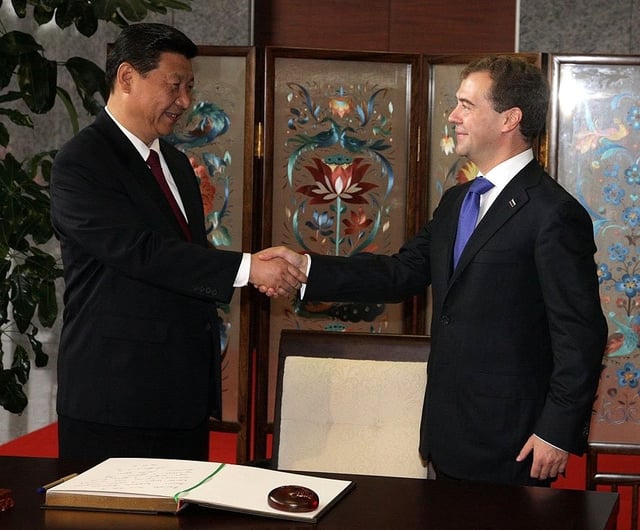
Xi Jinping with Russian President Dmitry Medvedev on 28 September 2010
Xi was appointed to the nine-man Politburo Standing Committee of the Communist Party of China at the 17th Party Congress in October 2007. He was ranked above Li Keqiang, an indication that he was going to succeed Hu Jintao as China's next leader. In addition, Xi also held the top-ranking membership of the Communist Party's Central Secretariat. This assessment was further supported at the 11th National People's Congress in March 2008, when Xi was elected as vice-president of the People's Republic of China.[68] Following his elevation, Xi has held a broad range of portfolios. He was put in charge of the comprehensive preparations for the 2008 Summer Olympics in Beijing, as well as being the central government's leading figure in Hong Kong and Macau affairs. In addition, he also became the new president of the Central Party School of the Communist Party of China, the cadre-training and ideological education wing of the Communist Party. In the wake of the 2008 Sichuan earthquake, Xi visited disaster areas in Shaanxi and Gansu. He made his first foreign trip as vice president to North Korea, Mongolia, Saudi Arabia, Qatar and Yemen from 17 to 25 June 2008.[69] After the Olympics, Xi was assigned the post of committee chair for the preparations of the 60th Anniversary Celebrations of the founding of the People's Republic of China. He was also reportedly at the helm of a top-level Communist Party committee dubbed the 6521 Project, which was charged with ensuring social stability during a series of politically sensitive anniversaries in 2009.[70]
Xi is considered one of the most successful members of the Crown Prince Party, a quasi-clique of politicians who are descendants of early Chinese Communist revolutionaries. Former prime minister of Singapore, Lee Kuan Yew, when asked about Xi, said he felt he was "a thoughtful man who has gone through many trials and tribulations".[71] Lee also commented: "I would put him in the Nelson Mandela class of persons. A person with enormous emotional stability who does not allow his personal misfortunes or sufferings affect his judgment. In other words, he is impressive".[72] Former U.S. Treasury Secretary Henry Paulson described Xi as "the kind of guy who knows how to get things over the goal line".[73] Australian Prime Minister Kevin Rudd said that Xi "has sufficient reformist, party and military background to be very much his own man".[74]
Trips as Vice President and Mexico commentary incident
In February 2009, in his capacity as vice-president, Xi Jinping embarked on a tour of Latin America, visiting Mexico,[75] Jamaica,[76] Colombia,[77] Venezuela,[78] and Brazil[79] to promote Chinese ties in the region and boost the country's reputation in the wake of the global financial crisis. He also visited Valletta, Malta, before returning to China.[80]
On 11 February, while visiting Mexico, Xi spoke in front of a group of overseas Chinese and explained China's contributions to the financial crisis, saying that it was "the greatest contribution towards the whole of human race, made by China, to prevent its 1.3 billion people from hunger".[4] He went on to remark: "There are some bored foreigners, with full stomachs, who have nothing better to do than point fingers at us. First, China doesn't export revolution; second, China doesn't export hunger and poverty; third, China doesn't come and cause you headaches. What more is there to be said?"[5][81] The story was reported on some local television stations. The news led to a flood of discussions on Chinese Internet forums and it was reported that the Chinese Ministry of Foreign Affairs was caught off-guard by Xi's remarks, as the actual video was shot by some accompanying Hong Kong reporters and broadcast on Hong Kong TV, which then turned up on various Internet video websites.[82]
Xi visited the United States, Ireland and Turkey in February 2012. This visit included meeting with then U.S. President Barack Obama at the White House[85] and then Vice President Joe Biden; and stops in California and Iowa, where he met with the family which previously hosted him during his 1985 tour as a Hebei provincial official.[86]
Disappearance
A few months before his ascendancy to the party leadership, Xi disappeared from official media coverage for several weeks beginning on 1 September 2012. On 4 September, he cancelled a meeting with U.S. Secretary of State Hillary Clinton, and later also cancelled meetings with Singapore's Prime Minister Lee Hsien Loong and a top Russian official. It was said that Xi effectively "went on strike" in preparation for the power transition in order to install political allies in key roles.[87] The Washington Post reported from a single source that Xi may have been injured in an altercation during a meeting of the "red second generation" which turned violent.[88]
Leadership
Accession to top posts
On 15 November 2012, Xi was elected to the post of general secretary of the Communist Party and chairman of the CPC Central Military Commission by the 18th Central Committee of the Communist Party of China. This made him, informally, the paramount leader and the first to be born after the founding of the People's Republic of China. The following day Xi led the new line-up of the Politburo Standing Committee onto the stage in their first public appearance.[89] The new Standing Committee reduced its number of seats from nine to seven, with only Xi himself and Li Keqiang retaining their seats from the previous Standing Committee; the remaining members were new.[90][91][92] In a marked departure from the common practice of Chinese leaders, Xi's first speech as general secretary was plainly worded and did not include any political slogans or mention of his predecessors.[93] Xi mentioned the aspirations of the average person, remarking, "Our people ... expect better education, more stable jobs, better income, more reliable social security, medical care of a higher standard, more comfortable living conditions, and a more beautiful environment." Xi also vowed to tackle corruption at the highest levels, alluding that it would threaten the Party's survival; he was reticent about far-reaching economic reforms.[94]
In December 2012, Xi visited Guangdong in his first trip outside Beijing since taking the Party leadership. The overarching theme of the trip was to call for further economic reform and a strengthened military. Xi visited the statue of Deng Xiaoping and his trip was described as following in the footsteps of Deng's own southern trip in 1992, which provided the impetus for further economic reforms in China after conservative party leaders stalled many of Deng's reforms in the aftermath of the Tiananmen Square protests of 1989. On his trip, Xi consistently alluded to his signature slogan the "Chinese Dream". "This dream can be said to be the dream of a strong nation. And for the military, it is a dream of a strong military", Xi told sailors.[95] Xi's trip was significant in that he departed from the established convention of Chinese leaders' travel routines in multiple ways. Rather than dining out, Xi and his entourage ate regular hotel buffet. He travelled in a large van with his colleagues rather than a fleet of limousines, and did not restrict traffic on the parts of the highway he travelled.[96]
Xi was elected President of the People's Republic of China on 14 March 2013, in a confirmation vote by the 12th National People's Congress in Beijing. He received 2,952 for, one vote against, and three abstentions.[89] He replaced Hu Jintao, who retired after serving two terms.[97] In his new capacity as president, on 16 March 2013 Xi expressed support for non-interference in China–Sri Lanka relations amid a United Nations Security Council vote to condemn that country over government abuses during the Sri Lankan Civil War.[98] On 17 March, Xi and his new ministers arranged a meeting with the chief executive of Hong Kong, CY Leung, confirming his support for Leung.[99] Within hours of his election, Xi discussed cyber security and North Korea with U.S. President Barack Obama over the phone. Obama announced the visits of treasury and state secretaries Jacob Lew and John F. Kerry to China the following week.[100]
Announcing reforms
In November 2013, at the conclusion of the Third Plenum of the 18th Central Committee, the Communist Party delivered a far-reaching reform agenda that alluded to changes in both economic and social policy. Xi signaled at the plenum that he was consolidating control of the massive internal security organization that was formerly the domain of Zhou Yongkang.[101] A new National Security Commission was formed with Xi at its helm. The Central Leading Group for Comprehensively Deepening Reforms—another ad-hoc policy coordination body led by Xi—was also formed to oversee the implementation of the reform agenda.[102] Termed "comprehensive deepening reforms" (全面深化改革; quánmiàn shēnhuà gǎigé), they were said to be the most significant since Deng Xiaoping's 1992 "Southern Tour". In the economic realm, the plenum announced that "market forces" would begin to play a "decisive" role in allocating resources.[101] This meant that the state would gradually reduce its involvement in the distribution of capital, and restructure state-owned enterprises to allow further competition, potentially by attracting foreign and private sector players in industries that were previously highly regulated. This policy aimed to address the bloated state sector that had unduly profited from an earlier round of re-structuring by purchasing assets at below-market prices, assets which were no longer being used productively. The plenum also resolved to abolish the laogai system of "re-education through labour" which was largely seen as a blot on China's human rights record. The system has faced significant criticism for years from domestic critics and foreign observers.[101] The one-child policy was also abolished, resulting in a shift to a two-child policy from 1 January 2016.[103]
In December 2013, Xi arrived unannounced at a small Beijing restaurant to have steamed buns for lunch, with only one person accompanying him. He paid for the meal himself and dined with regular patrons.[104] Xi was applauded for the 'common touch' of the visit, and images were circulated widely on social media.[104]
Anti-corruption campaign
Xi vowed to crack down on corruption almost immediately after he ascended to power at the 18th Party Congress. In his inaugural speech as general secretary, Xi mentioned that fighting corruption was one of the toughest challenges for the party.[105] A few months into his term, Xi outlined the "eight-point guide", listing rules intended to curb corruption and waste during official party business; it aimed at stricter discipline on the conduct of party officials. Xi also vowed to root out "tigers and flies", that is, high-ranking officials and ordinary party functionaries.[106] During the first two years of Xi's term, he initiated cases against former Central Military Commission vice-chairman Xu Caihou, former Politburo Standing Committee member and security chief Zhou Yongkang and former Hu Jintao chief aide Ling Jihua.[107] Along with new disciplinary chief Wang Qishan, Xi's administration spearheaded the formation of "centrally-dispatched inspection teams" (中央巡视组). These were essentially cross-jurisdictional squads of officials whose main task was to gain more in-depth understanding of the operations of provincial and local party organizations, and in the process, also enforce party discipline mandated by Beijing. Many of the work teams also had the effect of identifying and initiating investigations of high-ranking officials. Over one hundred provincial-ministerial level officials were implicated during a massive nationwide anti-corruption campaign. These included former and current regional officials (Su Rong, Bai Enpei, Wan Qingliang), leading figures of state-owned enterprises and central government organs (Song Lin, Liu Tienan), and highly ranked generals in the military (Gu Junshan). In June 2014, the Shanxi provincial political establishment was decimated, with four officials dismissed within a week from the provincial party organization's top ranks. Within the first two years of the campaign alone, over 200,000 low-ranking officials received warnings, fines, and demotions.[108]
Xi's anti-corruption campaign is seen by critics as a political purge on a scale not seen since Chairman Mao, with the aim of removing potential opponents and consolidating power. Xi's establishment of a new anti-corruption agency, the National Supervision Commission, that is ranked higher than the supreme court, has been described by Amnesty International's East Asia director as a "systemic threat to human rights" which "places tens of millions of people at the mercy of a secretive and virtually unaccountable system that is above the law".[109][110]
Censorship
"Document No. 9" is a confidential internal document widely circulated within the Communist Party of China in 2013 by the party's General Office.[111][112] It was first published in July 2012.[113] The document warns of seven dangerous Western values: constitutional democracy, universal values of human rights, civil society, pro-market neo-liberalism, media independence, historical nihilism (criticisms of past errors) and questioning the nature of Chinese style socialism.[114] Coverage of these topics in educational materials is forbidden.[115] The dangerous ideas presented by Western Constitutional Democracy included the separation of powers, multi-party systems, general elections, and an independent judiciary.[116] The threat from 'universal values' is the notion, contrary to Maoist doctrine, that the Western value system transcends nation in class, and applies to China.[117][118] 'Civil society' is the notion that individual rights are paramount, rather than the collective rights established by the Party. Neoliberalism refers to libertarian economic values and globalization. [119] Xi was especially hostile to Western ideas of journalism, and notions of a press that could criticize government and Party policies. The release of this internal document, which has introduced new topics that were previously not "off-limits", was seen as Xi's recognition of the "sacrosanct" nature of Communist Party rule over China.[114]
Since Xi became the General Secretary of the CPC, censorship has been "significantly stepped up".[120] Chairing the 2018 China Cyberspace Governance Conference on 20 and 21 April 2018, Xi committed to "fiercely crack down on criminal offenses including hacking, telecom fraud, and violation of citizens' privacy".[121] His administration has also overseen more Internet restrictions imposed in China, and is described as being "stricter across the board" on speech than previous administrations.[122] Xi's term has resulted in a further suppression of dissent from civil society. His term has seen the arrest and imprisonment of activists such as Xu Zhiyong, as well as numerous others who identified with the New Citizens' Movement. Prominent legal activist Pu Zhiqiang of the Weiquan movement was also arrested and detained.[123] The situation for users of Weibo has been described as a change from fearing that individual posts would be deleted, or at worst one's account, to fear of arrest.[124] A law enacted in September 2013 authorized a three-year prison term for bloggers who shared more than 500 times any content considered "defamatory".[125] The State Internet Information Department summoned a group of influential bloggers to a seminar instructing them to avoid writing about politics, the Communist Party, or making statements contradicting official narratives. Many bloggers stopped writing about controversial topics, and Weibo went into decline, with much of its readership shifting to WeChat users speaking to very limited social circles.[125]
In July 2017, the character Winnie the Pooh was blocked on Chinese social media sites following the spread of an internet meme in which photographs of Xi and other individuals were compared to Winnie the Pooh and other characters from the works of A. A. Milne[126] and in 2018, the Winnie the Pooh film Christopher Robin was denied a Chinese release.[127] This followed an incident where Chinese authorities censored a nine-year-old for comments about Xi's weight.[128]
Xi has taken a very strong stand to control internet usage inside China, including Google and Facebook.[129] The censorship of Wikipedia has been stringent. As of April 2019, all versions of Wikipedia have been blocked in China.[130]
Consolidation of power
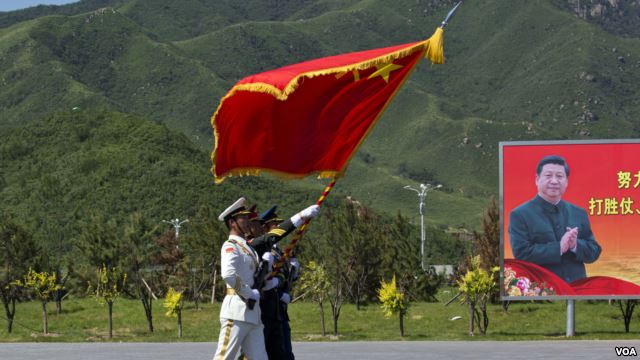
Portrait of Xi in Beijing, September 2015
Political observers have called Xi the most powerful Chinese leader since Mao Zedong, especially since the ending of presidential two-term limits in 2018.[131][132][133][134] Xi has notably departed from the collective leadership practices of his post-Mao predecessors. He has centralised his power and created working groups with himself at the head to subvert government bureaucracy, making himself become the unmistakable central figure of the new administration.[135] Beginning in 2013, the party under Xi has created a series of new "Central Leading Groups". These are supra-ministerial steering committees, designed to bypass existing institutions when making decisions, and ostensibly make policy-making a more efficient process. The most notable new body is the Central Leading Group for Comprehensively Deepening Reforms. It has broad jurisdiction over economic restructuring and social reforms, and is said to have displaced some of the power previously held by the State Council and its premier.[136] Xi also became the leader of the Central Leading Group for Internet Security and Informatization, in charge of cyber-security and Internet policy. The Third Plenum held in 2013 also saw the creation of the National Security Commission of the Communist Party of China, another body chaired by Xi which commentators have said would help Xi consolidate over national security affairs.[137][138]
Xi has also been active in his participation in military affairs, taking a direct hands-on approach to military reform. In addition to being the Chairman of the Central Military Commission, and the leader of the Central Leading Group for Military Reform founded in 2014 to oversee comprehensive military reforms, Xi has delivered numerous high-profile pronouncements vowing to clean up malfeasance and complacency in the military, aiming to build a more effective fighting force. In addition, Xi held the "New Gutian Conference" in 2014, gathering China's top military officers, re-emphasizing the principle of "the party has absolute control over the army" first established by Mao at the 1929 Gutian Conference.[139] According to a University of California, San Diego expert on Chinese military, Xi "has been able to take political control of the military to an extent that exceeds what Mao and Deng have done".[140]
On 21 April 2016 Xi was named commander-in-chief of the country's new Joint Operations Command Center of the People's Liberation Army by Xinhua news agency and the broadcaster China Central Television.[141][142] Some analysts interpreted this move as an attempt to display strength and strong leadership and as being more "political than military".[143] According to Ni Lexiong, a military affairs expert, Xi "not only controls the military but also does it in an absolute manner, and that in wartime, he is ready to command personally".[144]
Cult of personality

Portraits of Mao Zedong and Xi Jinping in a shop in China
Xi has had a cult of personality constructed around himself since entering office[145][146] with books, cartoons, pop songs and dance routines honouring his rule.[147] Following Xi's ascension to the leadership core of the CPC, he has been referred to as Xi Dada (Uncle or Papa Xi).[147][148] The village of Liangjiahe, where Xi was sent to work, has become a "modern-day shrine" decorated with Communist propaganda and murals extolling the formative years of his life.[149]
Removal of term limits
In March 2018, Xi received international condemnation after the party-controlled National People's Congress passed a set of constitutional amendments including removal of term limits for the president and vice president, the creation of a National Supervisory Commission, as well as enhancing the central role of the Communist Party.[150][151] On 17 March 2018, the Chinese legislature reappointed Xi as president, now without term limits; Wang Qishan was appointed vice president.[152][153] The following day, Li Keqiang was reappointed premier and longtime allies of Xi, Xu Qiliang and Zhang Youxia, were voted in as vice-chairmen of the state military commission.[154] Foreign minister Wang Yi was promoted to state councillor and General Wei Fenghe was named defence minister.[155]
According to the Financial Times, Xi expressed his views of constitutional amendment at meetings with Chinese officials and foreign dignitaries. Xi explained the decision in terms of needing to align two more powerful posts—General Secretary of the Communist Party and Chairman of the Central Military Commission (CMC)—which have no term limits.[156] However, Xi did not say whether he intended to serve as party general secretary, CMC chairman and state president, for three or more terms.
Legal reforms
The party under Xi announced a raft of legal reforms at the Fourth Plenum held in the fall 2014, and he called for "Chinese socialistic rule of law" immediately afterwards. The party aimed to reform the legal system which had been perceived as ineffective at delivering justice and affected by corruption, local government interference and lack of constitutional oversight. The plenum, while emphasizing the absolute leadership of the party, also called for a greater role of the constitution in the affairs of state and a strengthening of the role of the National People's Congress Standing Committee in interpreting the constitution.[157] It also called for more transparency in legal proceedings, more involvement of ordinary citizens in the legislative process, and an overall "professionalization" of the legal workforce. The party also planned to institute cross-jurisdictional circuit legal tribunals as well as giving provinces consolidated administrative oversight over lower level legal resources, which is intended to reduce local government involvement in legal proceedings.[158]
Foreign policy
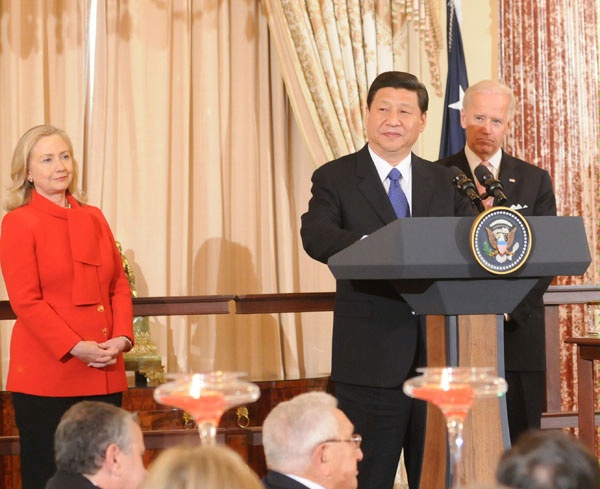
Xi giving a speech at the U.S. Department of State in 2012, with then Secretary of State Hillary Clinton and then Vice-President Joe Biden in the background. Seated in the front row is former Secretary of State Henry Kissinger.
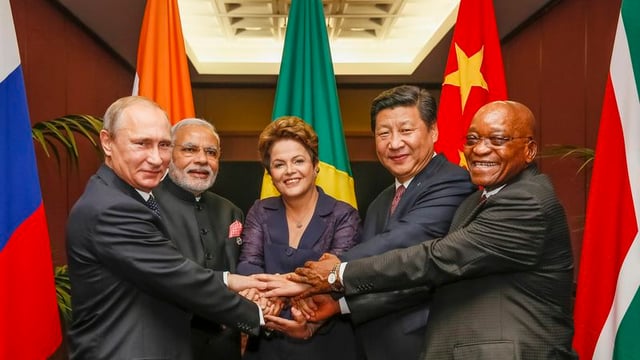
BRICS leaders Vladimir Putin, Narendra Modi, Dilma Rousseff, Xi Jinping and Jacob Zuma at the G20 summit in Brisbane, Australia, 15 November 2014
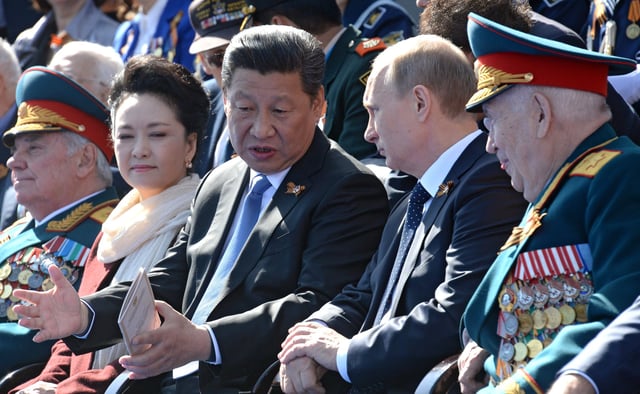
Xi with the first lady during the Moscow Victory Day Parade on 9 May 2015

Xi with Iran's Supreme Leader Ali Khamenei, 23 January 2016
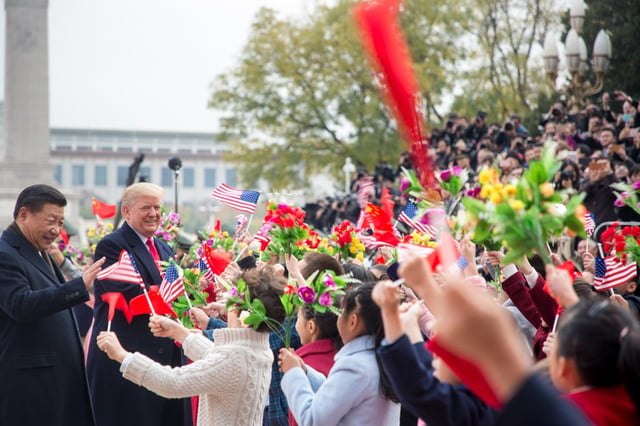
U.S. President Donald Trump arrives in China, 8 November 2017
Under Xi China has also taken a more critical stance on North Korea, while improving relationships with South Korea.[160] China–Japan relations have soured under Xi's administration; the most thorny issue between the two countries remains the dispute over the Senkaku islands, which China calls Diaoyu. In response to Japan's continued robust stance on the issue, China declared an Air Defense Identification Zone in November 2013.[161]
Xi has called China–United States relations in the contemporary world a "new type of great-power relations", a phrase the Obama administration had been reluctant to embrace.[162] Under his administration the Strategic and Economic Dialogue that began under Hu Jintao has continued. On China–U.S. relations, Xi said, "If [China and the United States] are in confrontation, it would surely spell disaster for both countries".[163] The U.S. has been critical of Chinese actions in the South China Sea.[162] In 2014, Chinese hackers compromised the computer system of the U.S. Office of Personnel Management,[164] resulting in the theft of approximately 22 million personnel records handled by the office.[165]
Xi has cultivated stronger relations with Russia, particularly in the wake of the Ukraine crisis of 2014. He seems to have developed a strong personal relationship with President Vladimir Putin. Both are viewed as strong leaders with a nationalist orientation who are not afraid to assert themselves against Western interests.[166] Xi attended the opening ceremonies of the 2014 Winter Olympics in Sochi. Under Xi, China signed a $400 billion gas deal with Russia; China has also become Russia's largest trading partner.[166]
Xi has also indirectly spoken out critically on the U.S. "strategic pivot" to Asia.[167] Addressing a regional conference in Shanghai on 21 May 2014, he called on Asian countries to unite and forge a way together, rather than get involved with third party powers, seen as a reference to the United States. "Matters in Asia ultimately must be taken care of by Asians. Asia's problems ultimately must be resolved by Asians and Asia's security ultimately must be protected by Asians", he told the conference.[168]
In November 2014, in a major policy address, Xi called for a decrease in the use of force, preferring dialogue and consultation to solve the current issues plaguing the relationship between China and its South East Asian neighbors.[169] In April 2015 Xi led a large delegation on a state visit to Pakistan. During this visit he signed energy and infrastructure deals worth $45 billion including the China–Pakistan Economic Corridor. Pakistan's highest civilian award, the Nishan-e-Pakistan, was conferred upon him.[170]
In April 2015, new satellite imagery revealed that China was rapidly constructing an airfield on Fiery Cross Reef in the Spratly Islands of the South China Sea.[171] In May 2015, U.S. Secretary of Defense Ash Carter warned the government of Xi Jinping to halt its rapid island-building in disputed territory in the South China Sea.[172] In spite of what seemed to be a tumultuous start to Xi Jinping's leadership vis-à-vis the United-States, on 13 May 2017 Xi said at the Belt and Road Forum in Beijing: "We should foster a new type of international relations featuring 'win-win cooperation', and we should forge a partnership of dialogue with no confrontation, and a partnership of friendship rather than alliance. All countries should respect each other's sovereignty, dignity and territorial integrity; respect each other's development path and its social systems, and respect each other's core interests and major concerns... What we hope to create is a big family of harmonious coexistence."[173]
Starting in 2017, China's relationship with South Korea soured over the THAAD purchase of the latter[174] while China's relations with North Korea increased because of meetings between Xi and North Korean leader Kim Jong-un.[175] At the G20 meeting in Japan, Xi called for a "timely easing" of sanctions imposed on North Korea.[176] In 4 June 2019, Xi told the Russian news agency TASS that he was "worried" about the current tensions between the U.S. and Iran.[177] He later told his Iranian counterpart Hassan Rouhani during a SCO meeting that China would promote ties with Iran regardless of developments from the Gulf of Oman incident.[178]
Foreign trips as President
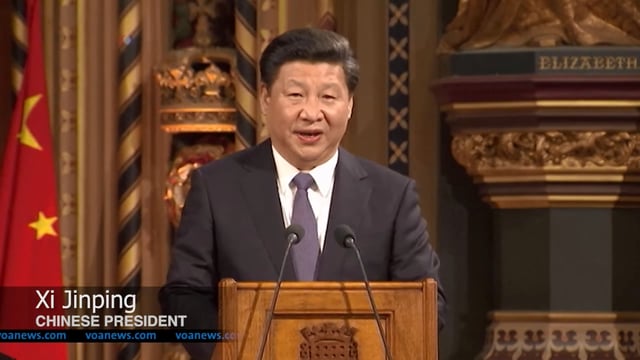
Xi, who was on a four-day state visit to the UK, addressed both Houses of Parliament at Westminster, 21 October 2015
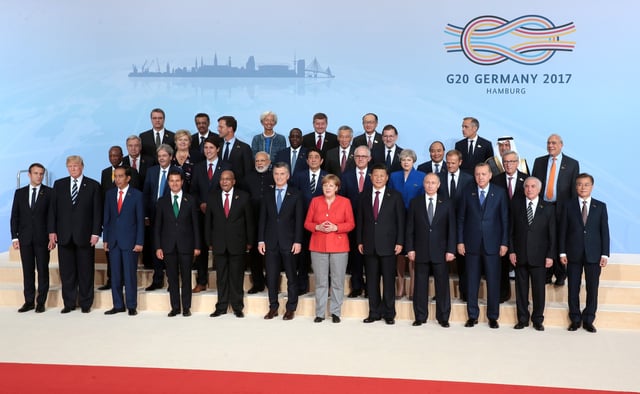
World leaders assemble for 'family photo' at G20 summit in Hamburg
Xi made his first foreign trip as president to Russia on 22 March 2013, about a week after he assumed the office. He met with President Vladimir Putin and the two leaders discussed trade and energy issues. He then went on to Tanzania, South Africa (where he attended the BRICS summit in Durban), and the Republic of the Congo.[179] Xi visited the United States at Sunnylands Estate in California in a 'shirtsleeves summit' with U.S. President Barack Obama in June 2013, although this was not considered a formal state visit.[180] In October 2013 Xi attended the APEC Summit in Bali, Indonesia.
In March 2014 Xi made a trip to Western Europe visiting the Netherlands, where he attended the Nuclear Security Summit in The Hague, followed by visits to France, Germany and Belgium.[181] He made a state visit to South Korea on 4 July 2014 and met with South Korean President Park Geun-hye.[182] Between 14 and 23 July, Xi attended the BRICS leaders' summit in Brazil and visited Argentina, Venezuela, and Cuba.[183]
Xi went on an official state visit to India and met with Indian Prime Minister Narendra Modi in September 2014; he visited New Delhi and also went to Modi's hometown in the state of Gujarat.[184] He went on a state visit to Australia and met with Prime Minister Tony Abbott in November 2014,[185] followed by a visit to the island nation of Fiji.[186] Xi visited Pakistan in April 2015, signing a series of infrastructure deals related to the China–Pakistan Economic Corridor. He then headed to Jakarta and Bandung, Indonesia, to attend the Afro-Asian Leaders Summit and the 60th Anniversary events of the Bandung Conference.[187] Xi visited Russia and was the guest-of-honour of Russian President Vladimir Putin at the 2015 Moscow Victory Day Parade to mark the 70th Anniversary of the victory of the allies in Europe. At the parade Xi and his wife Peng Liyuan sat next to Putin. On the same trip Xi also visited Kazakhstan and met with that country's president Nursultan Nazarbayev, and also met Alexander Lukashenko in Belarus.[188]
In September 2015, Xi made his first state visit to the United States.[189][190][191] In October 2015, he made a state visit to the United Kingdom, the first by a Chinese leader in a decade.[192] This followed a visit to China in March 2015 by the Duke of Cambridge. During the state visit, Xi met Queen Elizabeth II, British Prime Minister David Cameron and other dignitaries. Increased customs, trade and research collaborations between China and the UK were discussed, but more informal events also took place including a visit to Manchester City's football academy.[193]
In March 2016, Xi visited the Czech Republic on his way to United States. In Prague, he met with the Czech president, prime minister and other representatives to promote relations and economic cooperation between the Czech Republic and the People's Republic of China.[194] His visit was met by a considerable number of protests by Czechs.[195]
In January 2017, Xi became the first Chinese president to plan to attend the World Economic Forum in Davos.[196] On 17 January, Xi addressed the forum in a high-profile keynote, addressing globalization, the global trade agenda, and China's rising place in the world's economy and international governance; he made a series of pledges about China's defense of "economic globalization" and climate change accords.[196][197][198] Premier Li Keqiang attended the forum in 2015 and Vice-President Li Yuanchao did so in 2016. During the three-day state visit to the country in 2017 Xi also visited the World Health Organization, the United Nations and the International Olympic Committee.[198]
Belt and Road Initiative

Countries which signed cooperation documents related to the Belt and Road Initiative
Belt and Road Initiative was unveiled by Xi in September and October 2013 during visits to Kazakhstan and Indonesia,[201] and was thereafter promoted by Premier Li Keqiang during state visits to Asia and Europe. Xi made the announcement for the initiative while in Astana, Kazakhstan, and called it a "golden opportunity".[202]
Human rights policy
In 2017, the local government of the Jiangxi province told Christians to replace their pictures of Jesus with Xi Jinping.[205][206][207] The Associated Press reported in 2018 that "Xi is waging the most severe systematic suppression of Christianity in the country since religious freedom was written into the Chinese constitution in 1982", which has involved "destroying crosses, burning bibles, shutting churches and ordering followers to sign papers renouncing their faith".[208]
Political positions
Chinese Dream
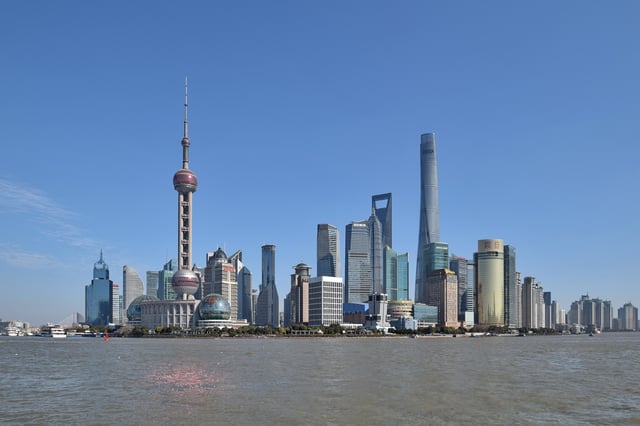
According to the Qiushi, the Chinese Dream is about Chinese prosperity, collective effort, socialism, and national glory.
Xi and Communist Party ideologues coined the phrase "Chinese Dream" to describe his overarching plans for China as its leader. Xi first used the phrase during a high-profile visit to the National Museum of China on 29 November 2012, where he and his Standing Committee colleagues were attending a "national revival" exhibition. Since then, the phrase has become the signature political slogan of the Xi era.[209] Since 2013, the phrase has emerged as the distinctive quasi-official ideology of the party leadership under Xi, much as the "Scientific Outlook on Development" was for Hu Jintao and the "Three Represents" was for Jiang Zemin. The origin of the term "Chinese Dream" is unclear. While the phrase has been used before by journalists and scholars,[210] some publications have posited the term likely drew its inspiration from the concept of the American Dream.[211] The Economist noted the abstract and seemingly accessible nature of the concept with no specific overarching policy stipulations may be a deliberate departure from the jargon-heavy ideologies of his predecessors.[212] While the Chinese Dream was originally interpreted as an extension of the American Dream, which emphasises individual self-improvement and opportunity,[212] the slogan's use in official settings since 2013 has taken on a noticeably more nationalistic character, with official pronouncements of the "Dream" being consistently linked with the phrase "great revival of the Chinese nation".[6] The policy implications of the "Chinese Dream" remain unclear.
Cultural revival
As communist ideology plays a less central role in the lives of the masses in the People's Republic of China, top political leaders of the Communist Party of China such as Xi continue the rehabilitation of ancient Chinese philosophical figures like Han Fei into the mainstream of Chinese thought alongside Confucianism, both of which Xi sees as relevant. At a meeting with other officials in 2013, he quoted Confucius, saying "he who rules by virtue is like the Pole Star, it maintains its place, and the multitude of stars pay homage." While visiting Shandong, the birthplace of Confucius, in November, he told scholars that the Western world was "suffering a crisis of confidence" and that the CPC has been "the loyal inheritor and promoter of China's outstanding traditional culture."[213]
Han Fei gained new prominence with favourable citations. One sentence of Han Fei's that Xi quoted appeared thousands of times in official Chinese media at the local, provincial, and national levels.[214]
Xi Jinping Thought
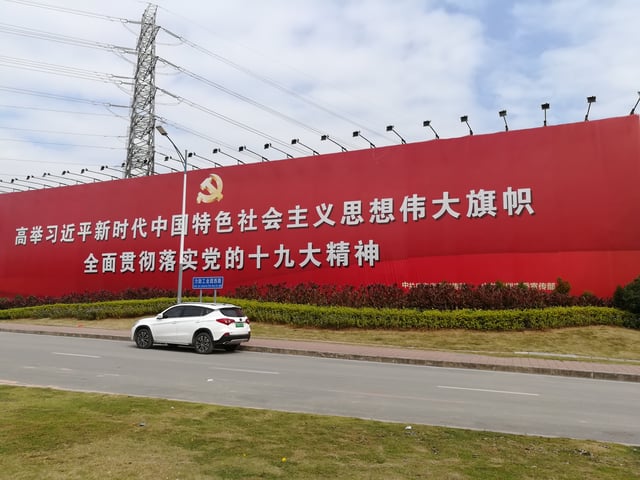
A billboard advertising Xi Jinping Thought in Shenzhen
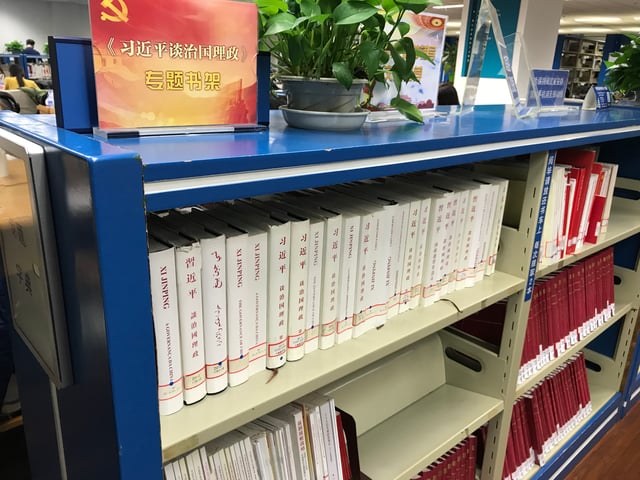
The Governance of China in different languages presented at Shanghai Library
In September 2017, the Communist Party Central Committee decided that Xi's political philosophies, generally referred to as "Xi Jinping Thought", would become part of the Party Constitution.[215][216] Xi first made mention of the "Thought on Socialism with Chinese Characteristics for a New Era" in his opening day speech delivered to the 19th Party Congress in October 2017. His Politburo Standing Committee colleagues, in their own reviews of Xi's keynote address at the Congress, prepended the name "Xi Jinping" in front of "Thought".[217] On 24 October 2017, at its closing session, the 19th Party Congress approved the incorporation of Xi Jinping Thought into the Constitution of the Communist Party of China.[131][218]
Xi himself has described the Thought as part of the broad framework created around Socialism with Chinese Characteristics, a Dengist term that places China in the "primary stage of socialism". In official party documentation and pronouncements by Xi's colleagues, the Thought is said to be a continuation of Marxism–Leninism, Mao Zedong Thought, Deng Xiaoping Theory, the "Three Represents", and the Scientific Development Perspective, as part of a series of guiding ideologies that embody "Marxism adopted to Chinese conditions" and contemporary considerations.[217]
The concepts and context behind Xi Jinping Thought are elaborated in Xi's The Governance of China book series, published by the Foreign Languages Press for an international audience. Volume one was published in September 2014, followed by volume two in November 2017.[219]
A slick tool for teaching “Xi Jinping Thought” has become the most popular smartphone app in China, as the country's ruling Communist Party launched a new campaign that calls on its cadres to immerse themselves in the political doctrine every day. Xuexi Qiangguo, which translates to “Study powerful country”, is now the most downloaded item on Apple's domestic App Store, surpassing in demand social media apps such as WeChat and TikTok – known as Weixin and Douyin, respectively, in mainland China.[220]
Role of the Communist Party
In Xi's view, the Communist Party is the legitimate, constitutionally-sanctioned ruling party of China, and that the party derives this legitimacy through advancing the Mao-style "mass line Campaign"; that is the party represents the interests of the overwhelming majority of ordinary people. In this vein, Xi called for officials to practise mild self-criticism in order to appear less corrupt and more popular among the people.[221][222][223]
Xi's position has been described as preferring highly centralized political power as a means to direct large-scale economic restructuring.[123] Xi believes that China should be "following its own path" and that a strong authoritarian government is an integral part of the "China model", operating on a "core socialist value system", which has been interpreted as China's alternative to Western values. However, Xi and his colleagues acknowledge the challenges to the legitimacy of Communist rule, particularly corruption by party officials. The answer, according to Xi's programme, is two-fold: strengthen the party from within, by streamlining strict party discipline and initiating a large anti-corruption campaign to remove unsavoury elements from within the party, and re-instituting the Mass Line Campaign externally to make party officials better understand and serve the needs of ordinary people. Xi believes that, just as the party must be at the apex of political control of the state, the party's central authorities (i.e., the Politburo, PSC, or himself as general secretary) must exercise full and direct political control of all party activities.[224]
Taiwan
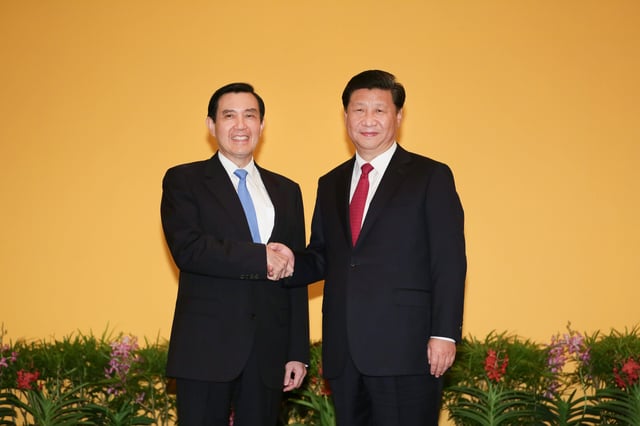
Xi Jinping met with Taiwanese president Ma Ying-jeou in November 2015 in their capacity as the leader of Mainland China and Taiwan respectively.
In the 19th Party Congress held in 2017, Xi reaffirmed six of the nine principles that had been affirmed continuously since the 16th Party Congress in 2002, with the notable exception of "Placing hopes on the Taiwan people as a force to help bring about unification".[227] According to the Brookings Institution, Xi used stronger language on potential Taiwan independence than his predecessors towards previous DPP governments in Taiwan.[227] In March 2018, Xi said that Taiwan would face the "punishment of history".[228]
In January 2019, Xi Jinping called on Taiwan to reject Taiwan's formal independence from China, saying: "We make no promise to renounce the use of force and reserve the option of taking all necessary means." Those options, he said, could be used against “external interference”. Xi also said that they "are willing to create broad space for peaceful reunification, but will leave no room for any form of separatist activities,"[229][230] Tsai Ing-Wen responded to the speech by saying Taiwan would not accept a one country, two systems arrangement with the mainland, while stressing for the need of all cross-strait negotiations to be on a government-to-government basis.[231]
Personal life
Family
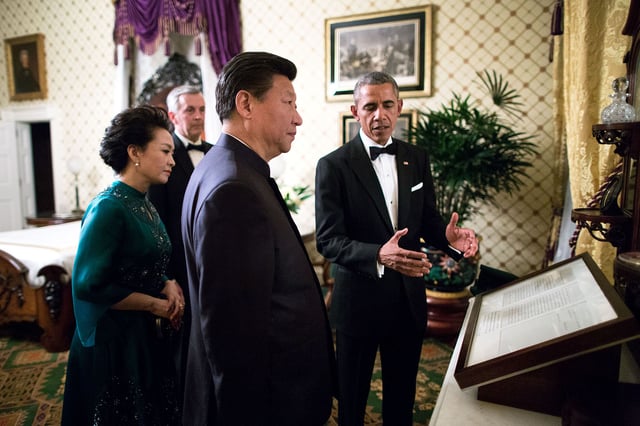
Xi Jinping, Peng Liyuan and U.S. President Barack Obama in the Lincoln Bedroom
Xi married the prominent Chinese folk singer Peng Liyuan in 1987.[234] Peng Liyuan, a household name in China, was better known to the public than Xi until his political elevation. The couple frequently lived apart due largely to their separate professional lives. Xi and Peng have a daughter named Xi Mingze, who graduated from Harvard University in the spring of 2015. While at Harvard, she used a pseudonym and studied Psychology and English.[235] Xi's family has a home in Jade Spring Hill, a garden and residential area in north-western Beijing run by the Central Military Commission.[236]
In June 2012, Bloomberg reported that members of Xi's extended family have substantial business interests, although there was no evidence he had intervened to assist them.[237] The Bloomberg website was blocked in mainland China in response to the article.[238] Since Xi embarked on an anti-corruption campaign, The New York Times reported members of his family were selling their corporate and real estate investments beginning in 2012.[239]
Relatives of highly placed Chinese officials, including seven current and former senior leaders of the Politburo of the Communist Party of China, have been named in the Panama Papers, including Deng Jiagui,[240] Xi's brother-in-law. Deng had two shell companies in the British Virgin Islands while Xi was a member of the Politburo Standing Committee, but they were dormant by the time Xi became general secretary of the Communist Party in November 2012.[241]
Personality
Peng described Xi as hardworking and down-to-earth: "When he comes home, I've never felt as if there's some leader in the house. In my eyes, he's just my husband."[242] Peng has played a much more visible role as China's "first lady" compared to her predecessors; for example, Peng hosted U.S. First Lady Michelle Obama on her high-profile visit to China in March 2014.[243] Xi was described in a 2011 The Washington Post article by those who know him as "pragmatic, serious, cautious, hard-working, down to earth and low-key". He was described as a good hand at problem solving and "seemingly uninterested in the trappings of high office".[244] He is known to love U.S. films such as Saving Private Ryan, The Departed and The Godfather.[245][246] He is also a fan of HBO television series Game of Thrones, watching a condensed version due to tight schedules.[247] He also praised the independent film-maker Jia Zhangke.[248]
Honours
- Foreign Honours
International Olympic Committee: The Golden Olympic order (19 November 2013)[249]
[[INLINE_IMAGE|//upload.wikimedia.org/wikipedia/commons/thumb/2/22/Grand_Crest_Ordre_de_Leopold.png/85px-Grand_Crest_Ordre_de_Leopold.png|//upload.wikimedia.org/wikipedia/commons/thumb/2/22/Grand_Crest_Ordre_de_Leopold.png/128px-Grand_Crest_Ordre_de_Leopold.png 1.5x, //upload.wikimedia.org/wikipedia/commons/thumb/2/22/Grand_Crest_Ordre_de_Leopold.png/170px-Grand_Crest_Ordre_de_Leopold.png 2x|Grand Crest Ordre de Leopold.png|h23|w85]] Belgium: Grand Cordon of the Order of Leopold (30 March 2014)[250]
[[INLINE_IMAGE|//upload.wikimedia.org/wikipedia/commons/thumb/2/2e/VEN_Order_of_the_Liberator_-Grand_Cordon_BAR.png/85px-VEN_Order_of_the_Liberator-Grand_Cordon_BAR.png|//upload.wikimedia.org/wikipedia/commons/thumb/2/2e/VEN_Order_of_the_Liberator-Grand_Cordon_BAR.png/128px-VEN_Order_of_the_Liberator-Grand_Cordon_BAR.png 1.5x, //upload.wikimedia.org/wikipedia/commons/thumb/2/2e/VEN_Order_of_the_Liberator-Grand_Cordon_BAR.png/170px-VEN_Order_of_the_Liberator-_Grand_Cordon_BAR.png 2x|VEN Order of the Liberator - Grand Cordon BAR.png|h23|w85]] Venezuela: Grand Cordon of the Order of the Liberator (20 July 2014)[250]
[[INLINE_IMAGE|//upload.wikimedia.org/wikipedia/commons/thumb/8/88/Ribbon_jose_marti.png/85px-Ribbon_jose_marti.png|//upload.wikimedia.org/wikipedia/commons/8/88/Ribbon_jose_marti.png 1.5x|Ribbon jose marti.png|h26|w85]] Cuba: Order of José Martí (22 July 2014)[250]
[[INLINE_IMAGE|//upload.wikimedia.org/wikipedia/commons/thumb/e/e2/Order_of_Pakistan.png/85px-Order_of_Pakistan.png|//upload.wikimedia.org/wikipedia/commons/e/e2/Order_of_Pakistan.png 1.5x|Order of Pakistan.png|h24|w85]] Pakistan: Nishan-e-Pakistan (21 April 2015)[250]
[[INLINE_IMAGE|//upload.wikimedia.org/wikipedia/commons/thumb/5/53/Spange_des_K%C3%B6nig-Abdulaziz-Ordens.png/85px-Spange_des_K%C3%B6nig-Abdulaziz-Ordens.png|//upload.wikimedia.org/wikipedia/commons/thumb/5/53/Spange_des_K%C3%B6nig-Abdulaziz-Ordens.png/128px-Spange_des_K%C3%B6nig-Abdulaziz-Ordens.png 1.5x, //upload.wikimedia.org/wikipedia/commons/thumb/5/53/Spange_des_K%C3%B6nig-Abdulaziz-Ordens.png/170px-Spange_des_K%C3%B6nig-Abdulaziz-Ordens.png 2x|Spange des König-Abdulaziz-Ordens.png|h23|w85]] Saudi Arabia: Order of Abdulaziz al Saud (19 January 2016)[250]
[[INLINE_IMAGE|//upload.wikimedia.org/wikipedia/commons/thumb/c/c9/Orden_Republike_Srbije.gif/85px-Orden_Republike_Srbije.gif|//upload.wikimedia.org/wikipedia/commons/thumb/c/c9/Orden_Republike_Srbije.gif/128px-Orden_Republike_Srbije.gif 1.5x, //upload.wikimedia.org/wikipedia/commons/thumb/c/c9/Orden_Republike_Srbije.gif/170px-Orden_Republike_Srbije.gif 2x|Orden Republike Srbije.gif|h23|w85]] Serbia: Order of the Republic of Serbia of the first order (18 June 2016)[251]
Belarus: Order for Promotion of Peace and Friendship (29 September 2016)[252]
Peru: Medal of Honor (21 November 2016)[250]
[[INLINE_IMAGE|//upload.wikimedia.org/wikipedia/commons/thumb/a/a8/Grand_Collar_of_the_Order_of_the_State_of_Palestine_ribbon.svg/85px-Grand_Collar_of_the_Order_of_the_State_of_Palestine_ribbon.svg.png|//upload.wikimedia.org/wikipedia/commons/thumb/a/a8/Grand_Collar_of_the_Order_of_the_State_of_Palestine_ribbon.svg/128px-Grand_Collar_of_the_Order_of_the_State_of_Palestine_ribbon.svg.png 1.5x, //upload.wikimedia.org/wikipedia/commons/thumb/a/a8/Grand_Collar_of_the_Order_of_the_State_of_Palestine_ribbon.svg/170px-Grand_Collar_of_the_Order_of_the_State_of_Palestine_ribbon.svg.png 2x|Grand Collar of the Order of the State of Palestine ribbon.svg|h24|w85]] Palestine: Grand Collar of the State of Palestine (18 July 2017)[253]
[[INLINE_IMAGE|//upload.wikimedia.org/wikipedia/commons/thumb/3/3b/OOSA.jpg/85px-OOSA.jpg|//upload.wikimedia.org/wikipedia/commons/thumb/3/3b/OOSA.jpg/128px-OOSA.jpg 1.5x, //upload.wikimedia.org/wikipedia/commons/thumb/3/3b/OOSA.jpg/170px-OOSA.jpg 2x|OOSA.jpg|h24|w85]] Russia: Knight of the Order of Saint Andrew (3 July 2017)[254]
[[INLINE_IMAGE|//upload.wikimedia.org/wikipedia/commons/thumb/8/8c/Order_Zayed_rib.png/85px-Order_Zayed_rib.png|//upload.wikimedia.org/wikipedia/commons/thumb/8/8c/Order_Zayed_rib.png/128px-Order_Zayed_rib.png 1.5x, //upload.wikimedia.org/wikipedia/commons/thumb/8/8c/Order_Zayed_rib.png/170px-Order_Zayed_rib.png 2x|Order Zayed rib.png|h23|w85]] United Arab Emirates: Order of Zayed (20 July 2018)[255]
[[INLINE_IMAGE|//upload.wikimedia.org/wikipedia/commons/thumb/f/f7/ARG_Order_of_the_Liberator_San_Martin_-Grand_Cross_BAR.png/85px-ARG_Order_of_the_Liberator_San_Martin-Grand_Cross_BAR.png|//upload.wikimedia.org/wikipedia/commons/thumb/f/f7/ARG_Order_of_the_Liberator_San_Martin-Grand_Cross_BAR.png/128px-ARG_Order_of_the_Liberator_San_Martin-Grand_Cross_BAR.png 1.5x, //upload.wikimedia.org/wikipedia/commons/thumb/f/f7/ARG_Order_of_the_Liberator_San_Martin-Grand_Cross_BAR.png/170px-ARG_Order_of_the_Liberator_San_Martin-_Grand_Cross_BAR.png 2x|ARG Order of the Liberator San Martin - Grand Cross BAR.png|h23|w85]] Argentina: Collar of the Order of the Liberator General San Martin (2 December 2018)[256]
[[INLINE_IMAGE|//upload.wikimedia.org/wikipedia/commons/thumb/4/40/KRG_Order_Manas.png/85px-KRG_Order_Manas.png|//upload.wikimedia.org/wikipedia/commons/thumb/4/40/KRG_Order_Manas.png/128px-KRG_Order_Manas.png 1.5x, //upload.wikimedia.org/wikipedia/commons/thumb/4/40/KRG_Order_Manas.png/170px-KRG_Order_Manas.png 2x|KRG Order Manas.png|h23|w85]] Kyrgyzstan: Order of Manas (13 June 2019)[257]
Tajikistan: Order of the Crown (15 June 2019)[258]
- Key to the City
[[INLINE_IMAGE|//upload.wikimedia.org/wikipedia/commons/thumb/a/aa/Flag_of_Iowa.svg/23px-Flag_of_Iowa.svg.png|//upload.wikimedia.org/wikipedia/commons/thumb/a/aa/Flag_of_Iowa.svg/35px-Flag_of_Iowa.svg.png 1.5x, //upload.wikimedia.org/wikipedia/commons/thumb/a/aa/Flag_of_Iowa.svg/45px-Flag_of_Iowa.svg.png 2x|Iowa|h15|w23|thumbborder flagicon-img flagicon-img]] Muscatine, Iowa, U.S. (26 April 1985)[259][260]
Muscatine, Iowa, U.S. (14 February 2012)[259]
Montego Bay, Jamaica (13 February 2009)[261]
San José, Costa Rica (3 June 2013)[262]
Mexico City, Mexico (5 June 2013)[262]
Buenos Aires, Argentina (19 July 2014)[262]
Prague, Czech Republic (29 March 2016)[262]
See also
New Zhijiang Army
Belt and Road Initiative
Xi–Li Administration
Xi Jinping Core Administration
Xi Jinping Thought
Xi Jinping's cult of personality
General Secretary Xi Jinping important speech series
China-United States trade war
